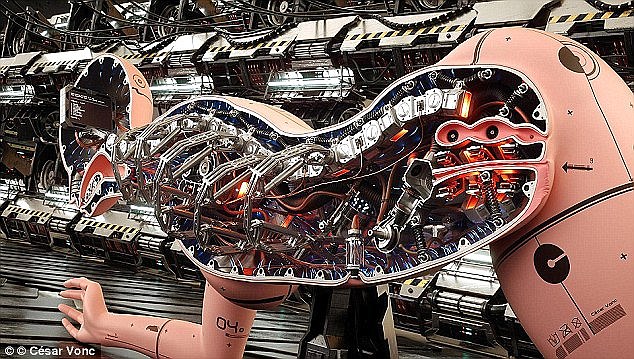
‘Sex’ lives for men are about to change according to a recent article written at The Guardian. Jenny Kleeman wrote on April 27th that a robot named Harmony “is the front-runner in the race to create the world’s first commercially available sex robot.” The author stated that Harmony has an “AI-enhanced head on a RealDoll’s body” and it “will cost $15,000 (£11,700) when it goes on sale at the end of the year.” That $15,000 price tag won’t make Harmony a realistic dream for the common wage earner. However, new technology is often most expensive when it first comes out. Who knows what that price tag will come down to in the future and likewise, when sex robots are accessible, who knows what the effects of them will be on cultures where the robots don’t become taboo.
In regard to speculation on those effects here’s a question for you to ponder: if, as The Buggles claimed, video killed the radio star then what will sex robots kill? In answering that, firstly, it should be noted that sex robots are almost exclusively being developed for the use of heterosexual men. It could be that ones for women are down the line or less covered in current commentary on the topic, but then if we’re all honest with ourselves, it’s not surprising that early sex-robot sellers would be primarily concerned with finding male customers. Men are often the ones that have trouble finding a willing partner.
So if video killed the radio star then sex robots, when they become affordable, will firstly do away with previous male-oriented sex toys. I think we can agree that a sex robot that is far more lifelike compared to a blow-up doll would become the masturbation toy of choice for men that use these kinds of products. If sex robots became readily affordable, then they’d kill the blow-up doll.
As for social/societal effects, maybe sex robots could curtail male usage of female prostitutes as well. Prostitution, especially the street kind, can ruin neighborhoods and it’s considered a high-risk lifestyle because John’s are often bad men. Furthermore, both Johns and prostitutes are all at immense risk when it comes to health risks like sexually-transmitted diseases. If sex robots curb prostitution in the future, I think the next-generation sociologist might point to some positive effects.
As far the affordability topic, consider the possibility that sex robots might become rentable. There’s a Daily Mail article from earlier this month with the headline “Robot BROTHEL could soon open in the UK to allow punters to perform ‘any of their sexual fantasies'” (April 24th/Author: Shivali Best).
On the topic of STDs, I think that sex-robot brothels might mitigate the risk of fluid-exchange diseases compared to street prostitution. However, it’s probably just a matter of time before health risks associated with sex-robot brothels start to emerge. Just as hotels vary on their cleanliness, you have to wonder how gross the paraphernalia in sex-robot brothels might get due to apathetic employees. It stands to reason that a sex-brothel patron could get an STD from a sex robot that wasn’t properly cleaned if the robot is Joe Herpes’ sloppy seconds. Take my word for it, some kind of health phenomenon will rise up from sex robots.
But how might affordable sex robots meant for heterosexual men change the romantic dynamics between a man and woman? The technology is new, but it will certainly improve and, in a male-dominated world, it can be expected to improve for the man’s benefit. Could sex robots replace real women to some extent? That could partly depend to a degree on how delusional the future male users of sex robots are.
According to Kleeman, Harmony “will be able to fill a niche…by talking, learning and responding to her owner’s voice.” Furthermore, “Harmony is designed to be as much a substitute partner as a sex toy.” I like Kleeman’s use of the word “designed” in those statements: it’s a reminder that Harmony is a product of human ingenuity. However, I found the following statements kind of freaky:
“Harmony smiles, blinks and frowns. She can hold a conversation, tell jokes and quote Shakespeare. She’ll remember your birthday…what you like to eat, and the names of your brothers and sisters. She can hold a conversation about music, movies and books. And of course, Harmony will have sex with you whenever you want.”
A female author using the feminine pronoun “she” for scraps of metal and silicon speaks to the forthcoming delusionality when it comes to sex robots. All the usages of “she” in the above passage should be replaced by “it.” If a female author is personifying a man’s masturbation toy by giving it feminine pronouns, I shudder to think about the effect “it” will have on lonely men that are immersed in a sexual fantasy with “it.” In all writing, I think personification of inanimate sex toys should be avoided. It, the sex-robot dubbed Harmony, won’t “hold a conversation” with you, but *it* will spit out programmed responses.
When it comes to playing house with Harmony, a temporary fantasy could totally be harmless. However, you could see how some men might be heading for a psychosis, a term which a Google search defines as “a severe mental disorder in which thought and emotions are so impaired that contact is lost with external reality.” I think an example of a psychosis is someone that plays Dungeons and Dragons so much that they start to actually see regular old men walking with their canes as warlocks with staffs. There’s an impairment of thought and a disconnect with reality there. In regard to sex robots, when “she” starts getting used where “it” should be used the path to psychosis begins.
“Harmony mimics smiles, blinks, and frowns. It’s programmed to simulate conversation, tell jokes from its database, and quote Shakespeare. It’ll remember your birthday, what you like to eat, and the names of your brothers and sisters much like a computer can. It can simulate a conversation about music, movies, and books. And of course, Harmony will improve your enjoyment of masturbation whenever you want.”
That’s how the passage should be written. Kleeman’s words sound like marketing guff that will take men out of reality — and maybe even out of the gene pool.
After all, the big difference between Harmony and a woman is that “it” can’t reproduce while “she” can. Any man that goes into one of the forthcoming ‘she’-really-loves-me-sex-robot psychoses might never come out of it. That could prevent him from reproducing if you think about it. Who knows, maybe a man that likes a robot for a wife might also demand, as a consumer, a robot kid. One-man ‘households’ could become microcosmic simulations of the patriarch where a control-freak man is ‘loved’ by his never unhappy nor exploited simulated wife. His robot kid gets straight A’s, does household chores, and wants to fulfill the man’s dreams that he never fulfilled as a child. Pat your robot son on the head: “I want to make the NHL like you never did,” it says.
In conclusion, here’s a little riddle/quasi-logical syllogism for you.
Maria Sharapova is a woman. Harmony is a robot. A lot of men crush on her for her good looks.
Who does the word “her” refer to in the above passage? Grammar rules that tie pronouns to the most-recently used candidate word might have some saying “Harmony,” but those not on the path to psychosis will finger wag. Harmony is an “it” while Sharapova is a “she.” Mind your pronouns and stay in reality.




